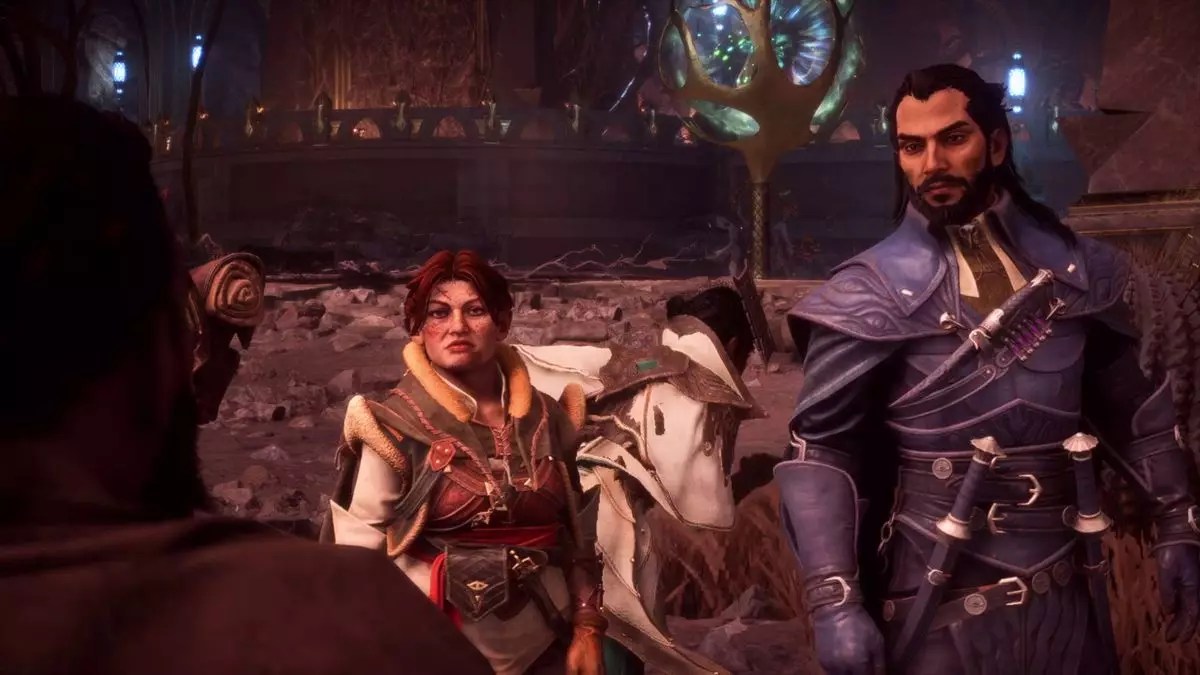The world of Dragon Age has long been revered for its intricate storytelling, profound choices, and morally ambiguous scenarios. In the latest installment, Dragon Age Veilguard, players find themselves faced with an unexpectedly weighty decision during a crucial moment. The cities of Minrathous and Treviso are both under siege by the formidable Blight Dragons, servants of the malevolent Ghilan’nain. The player must make an excruciating choice: which city to help, knowing that whichever decision is made will drastically affect the narrative and the fate of their companions. This predicament is not merely a matter of personal preference; it has significant consequences for both cities and the affiliated factions.
Upon entering the decision-making moment, players are greeted with a jarring lack of preparation. Unlike other pivotal choices, there is no extensive buildup or opportunity to gather essential information about either city or its champions, Neve and Lucanis. This deliberate design decision effectively embodies the real-life weight of sudden choices where the stakes are high and the outcomes uncertain. Choosing to assist one city means that the other city—along with its respective companion and faction—will undoubtedly suffer. For instance, opting to help Minrathous leads to treacherous repercussions for Treviso and its leader, Lucanis, while vice versa yields equally devastating outcomes for Neve and the Shadow Dragons.
This lack of foresight can leave players grappling with the emotional gravity of their decision. Each city and companion represents not only a narrative thread but also a set of values and allegiances that players may have developed throughout their journey. Thus, implementing a decision that seems to favor one while jeopardizing another does not merely reflect gameplay mechanics but speaks volumes about the nature of sacrifice in decision-making.
Making a choice between aiding Minrathous or Treviso results in radically different consequences that players must grapple with. If assistance is given to Minrathous, players will face the daunting challenge of confronting a Blight Dragon. However, Ghilan’nain’s intervention leads to a strategic withdrawal, resulting in averting further harm to Minrathous. The Venatori faction’s coup attempt is thwarted, likely empowering the Shadow Dragons in their constantly shifting power struggles. Yet, the citizens of Treviso face a darker fate, as their city is overrun by blight, prompting automatic failures of pre-existing side quests.
In contrast, choosing to support Treviso directs the narrative flow toward the preservation of its civilians, with blight failing to engulf the canals, thus saving many innocent lives. However, this compassionate act comes at a hefty price. Minrathous falls prey to the same catastrophic fate it previously avoided, bringing with it an array of new quests that highlight the city’s decline and loss. In either case, the intertwining paths of choices mean that the player can never escape the repercussions of their decision.
Integrating romance into these narrative choices only complicates the emotional stakes further. Players who wish to pursue a romantic subplot with Lucanis must note that this option closes off should they decide to help Minrathous. Conversely, those inclined towards Neve will encounter fewer limitations but will witness the fallout of their decision on her fate. The mechanisms of the game lend themselves to this kind of relational complexity, fostering a nuanced layer that adds to the overall player experience.
Players are left with the emotional toll of their decisions, which may lead to lasting impacts on their sense of morality even beyond the screen. Forced into a position of choice immediately after recruiting Davrin seems particularly intentional, as it thrusts the player into zealously defending the realm, demonstrating that the stakes of being a Veilguard member are far elevated.
Importantly, players are reminded that they possess the power to rewind their choices. While it can be tempting to accept the outcome and move forward in the story, reloading a save may allow exploration of alternate outcomes, exposing the various narratives that could emerge based on differing choices. However, the limitations placed by automatic side quest failures emphasize the intricate weave of Dragon Age’s storytelling fabric.
In sum, the decision to help either Minrathous or Treviso in Dragon Age Veilguard reflects broader themes of sacrifice, loyalty, and consequence inherent in the franchise. Players don’t just influence the fate of two cities; they engage in a narrative that challenges their ethical boundaries while ensuring that no outcome is entirely devoid of pain or loss. The beauty—and the burden—of being a player in this universe lies in navigating these labyrinthine choices, each leading to destinations unknown yet profoundly impactful.


Leave a Reply